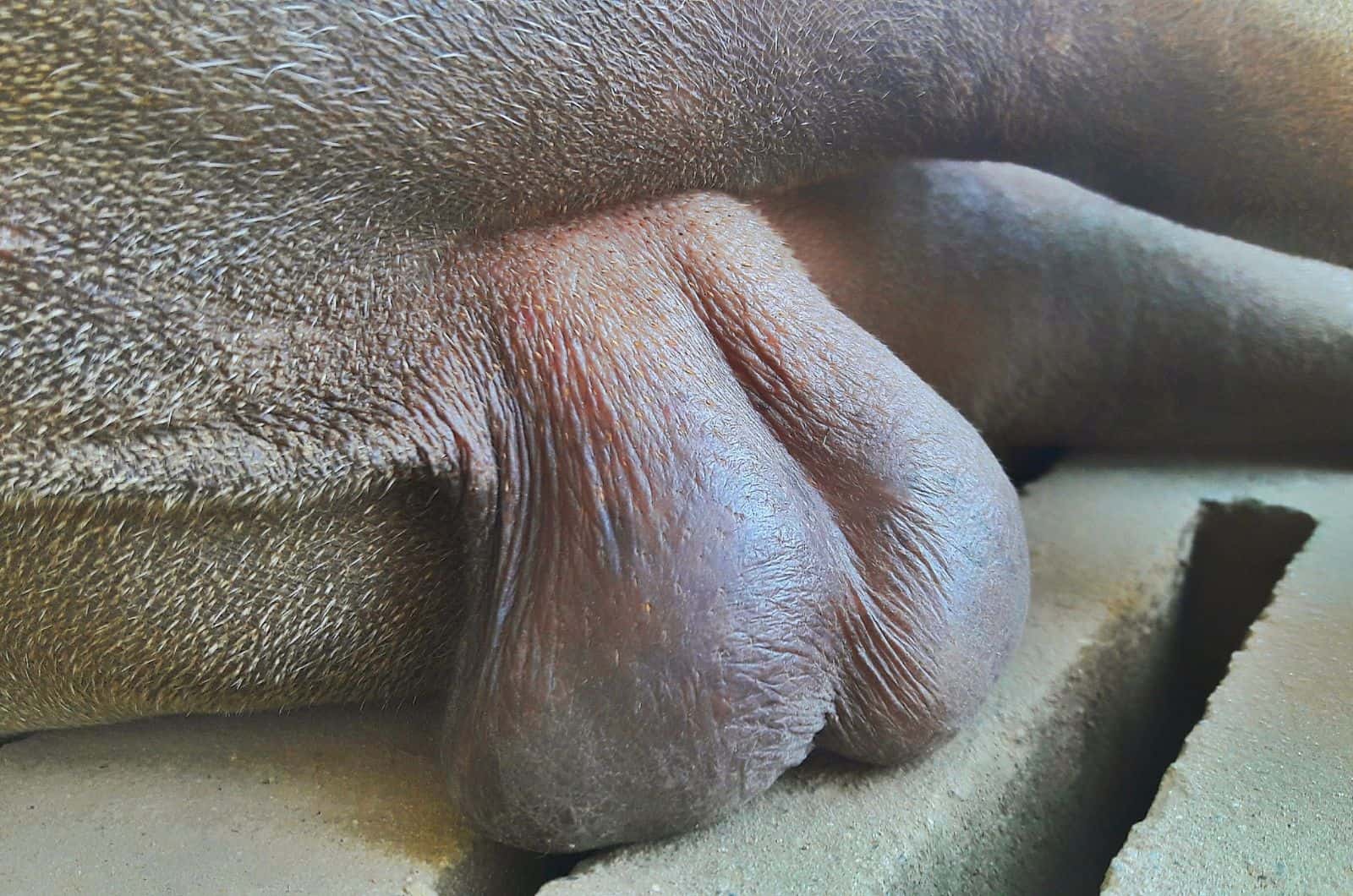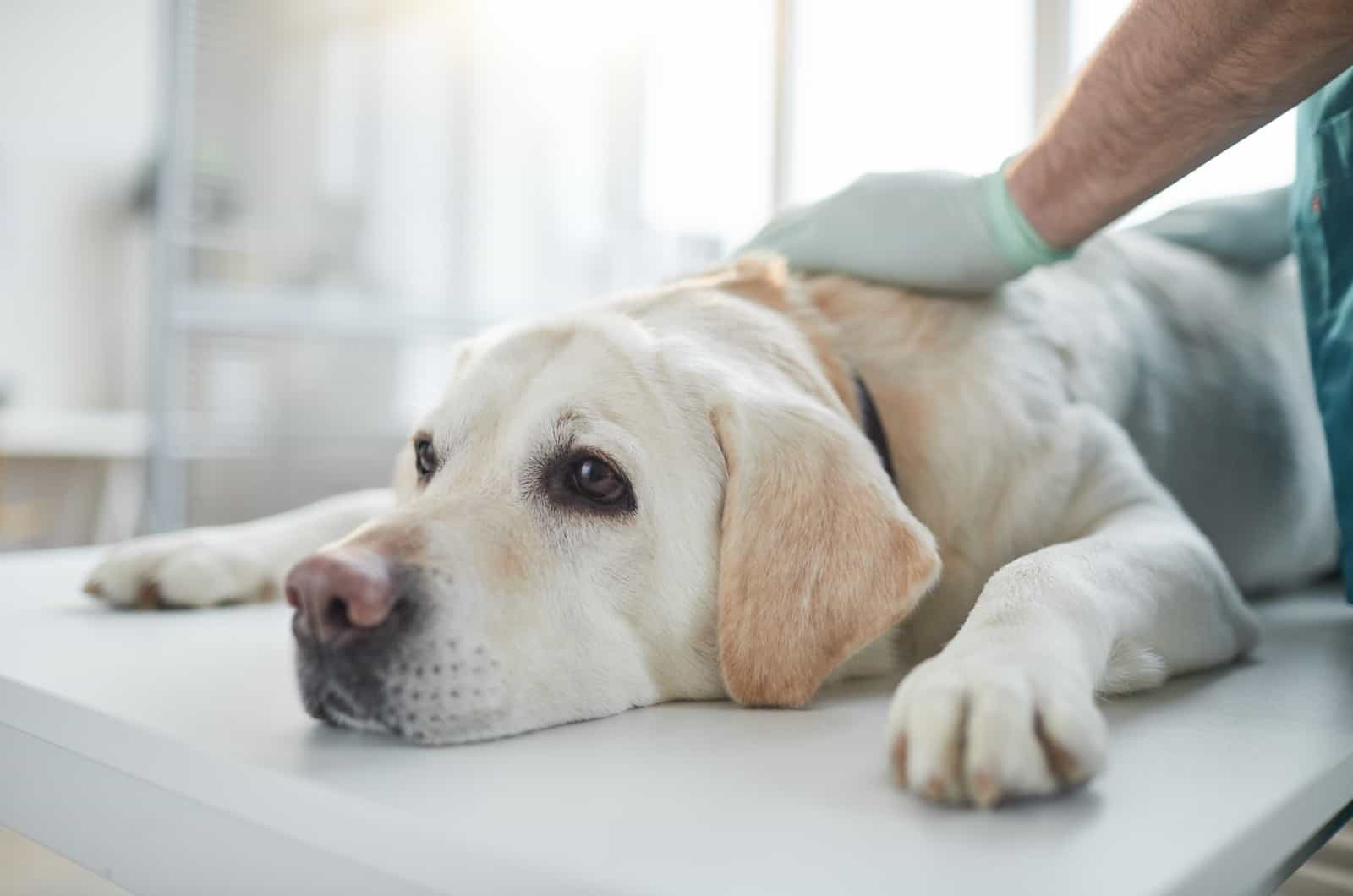Do you have to shout, “COME HERE!” several times, and you still get that head tilt from your dog before he actually comes to you?
Then, you start to panic and think, “What if my dog’s getting old? Is it… senile deafness?”
But, wait a minute… Your German Shepherd is only 3 years old. He can’t be old.
What can it be?
There are 9 symptoms to look out for that can tell you your German Shepherd has an ear infection. Yes, one of the German Shepherd ear infection symptoms can be a change in hearing.
But, it’s just one of 9 symptoms.
Let’s see what the other 8 are so that we can act in time and take our doggo to the vet.
Oh, and don’t panic – hearing loss is (in 99% of cases) not permanent. I SAID IT IS NOT PERMANENT!
Are you sure your dog has a problem…?
German Shepherd Ear Infection Symptoms
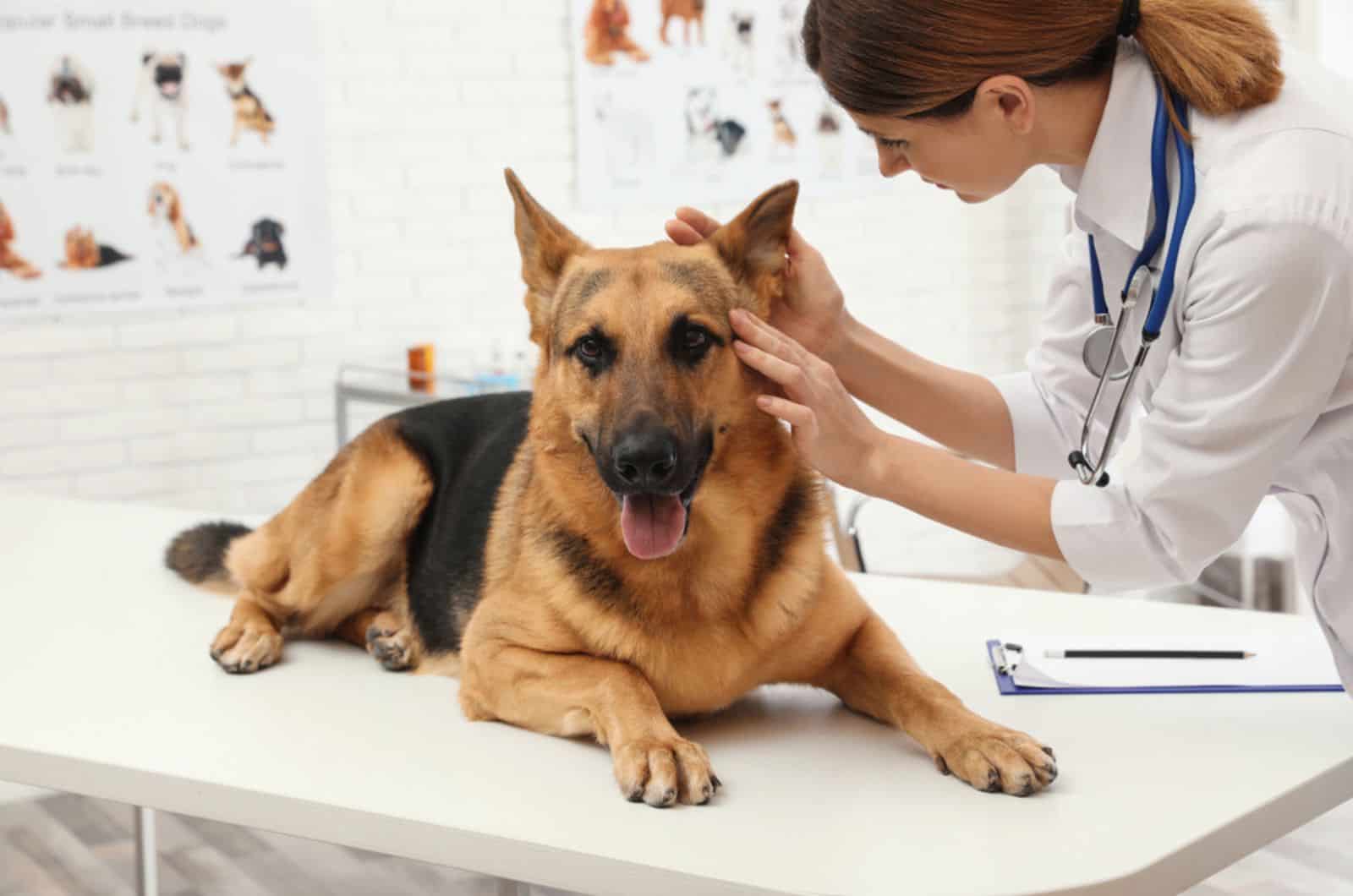
As we all know, dogs don’t have a direct way of telling us what is wrong. They will either show a change in their behavior or we will notice some external changes on our own.
However, some changes are subtle, and you need to know what you are looking for in order to notice them and connect them with an ear infection.
You have 9 German Shepherd ear infection symptoms in front of you. They are all explained, and will surely serve you well if you have a German Shepherd dog at home.
1. Ear Scratching
One of the first symptoms of German Shepherd ear infection is ear scratching. In other words, your GSD will scratch its ear more than usual like it is trying to remove something from the inside.
You might want to check the ear right away as soon as you notice your dog is scratching its ear all day long.
It might not be an ear infection at all.
It could be a foreign object stuck inside. Or, it could be another health problem connected with the outer part of those cute GSD ears.
However, if you notice your dog scratches its ears, and you also see other symptoms that we are about to mention – it’s vet trip time.
2. Shaking Head
Again, these types of behavior are not necessarily bad things. But, when they are frequent, they require our attention.
Think about why your GSD would shake its head so much. Is it because something is stuck in its fur? Or, perhaps it has something in its ear/ears? Maybe it’s an ear infection slowly spreading and causing discomfort.
Dogs do the only things they know how to do – shake and tilt their head or scratch their ears. They can also rub their face on the carpet or seem to be doing that, when actually, they are trying to get rid of the bad feeling in their ear.
Shine a light inside your dog’s ear and see what is inside. Don’t forget to check the outside of the ear (the earlobe) as well.
You might find the next symptoms when you examine your GSD’s ear.
3. Redness and/or Swelling
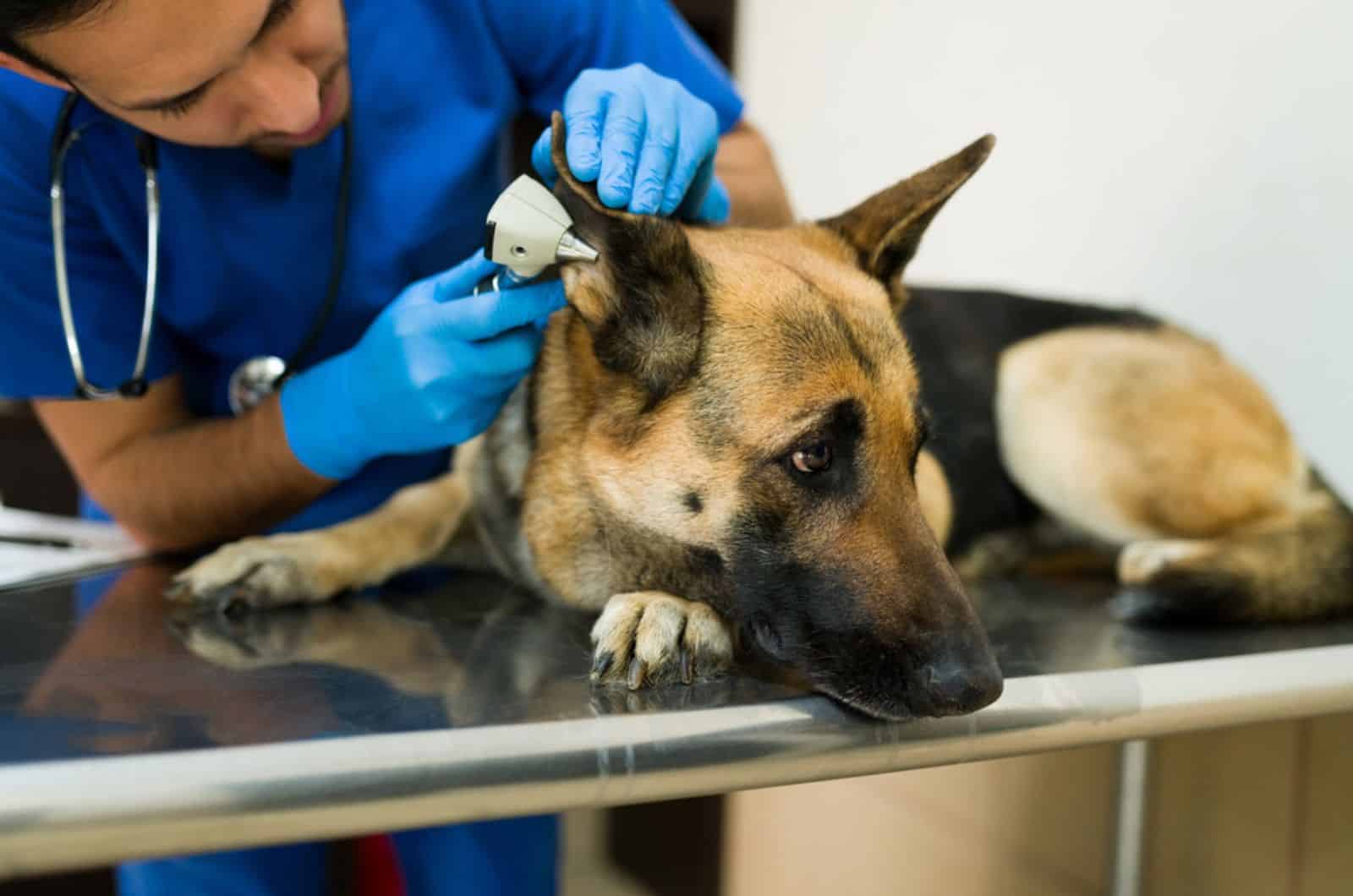
When you shine a light inside your GSD’s ear, you might notice some common infection signs:
- Rubor
- Calor
- Dolor
- Tumor
These are Latin names for:
- Redness (rubor)
- Increased temperature (calor)
- Pain (dolor)
- Swelling (tumor)
These symptoms are not strictly ear infection symptoms. These are common symptoms of any infection in both the human and the canine body.
As you can see, redness and swelling, accompanied by increased temperature (heat) in the affected ear, is also a GSD ear infection symptom.
Just be careful when you inspect your dog’s ear. It can be quite painful for the dog.
The swelling doesn’t have to be very noticeable. It depends on the infection stage, and the localization.
It is the same for the redness of the inner and outer ear tissue.
Read Next: Dogs’ Ears Are Cold
4. Pain
If the ear infection is, in fact, present, pain will be one of the symptoms. The pain can be mild, especially in the beginning, but it can progress and be severe, causing your dog to cry, whine, or become restless (even at night).
Don’t try to give your dog over-the-counter medicine. The painkillers we use are not necessarily good for dogs. You can do more harm than good – even poison your dog.
So, take your dog to the vet first.
5. Ear Discharge
Ear discharge can have various colors (or ear wax colors), which can mean different things or imply different diseases of the dog’s ear canal.
If it is an ear infection, one of the most common ear discharges is a dark discharge. It can be brownish, dark yellow, or orange.
It definitely doesn’t look like a normal thing you find in your dog’s ear.
If you want to clean it, be careful, and never use q-tips. They can harm the ear drum and cause a lot more damage than the ear infection itself.
Use cotton balls and lukewarm water.
Don’t forget to dry the ear afterward.
6. Ear Odor
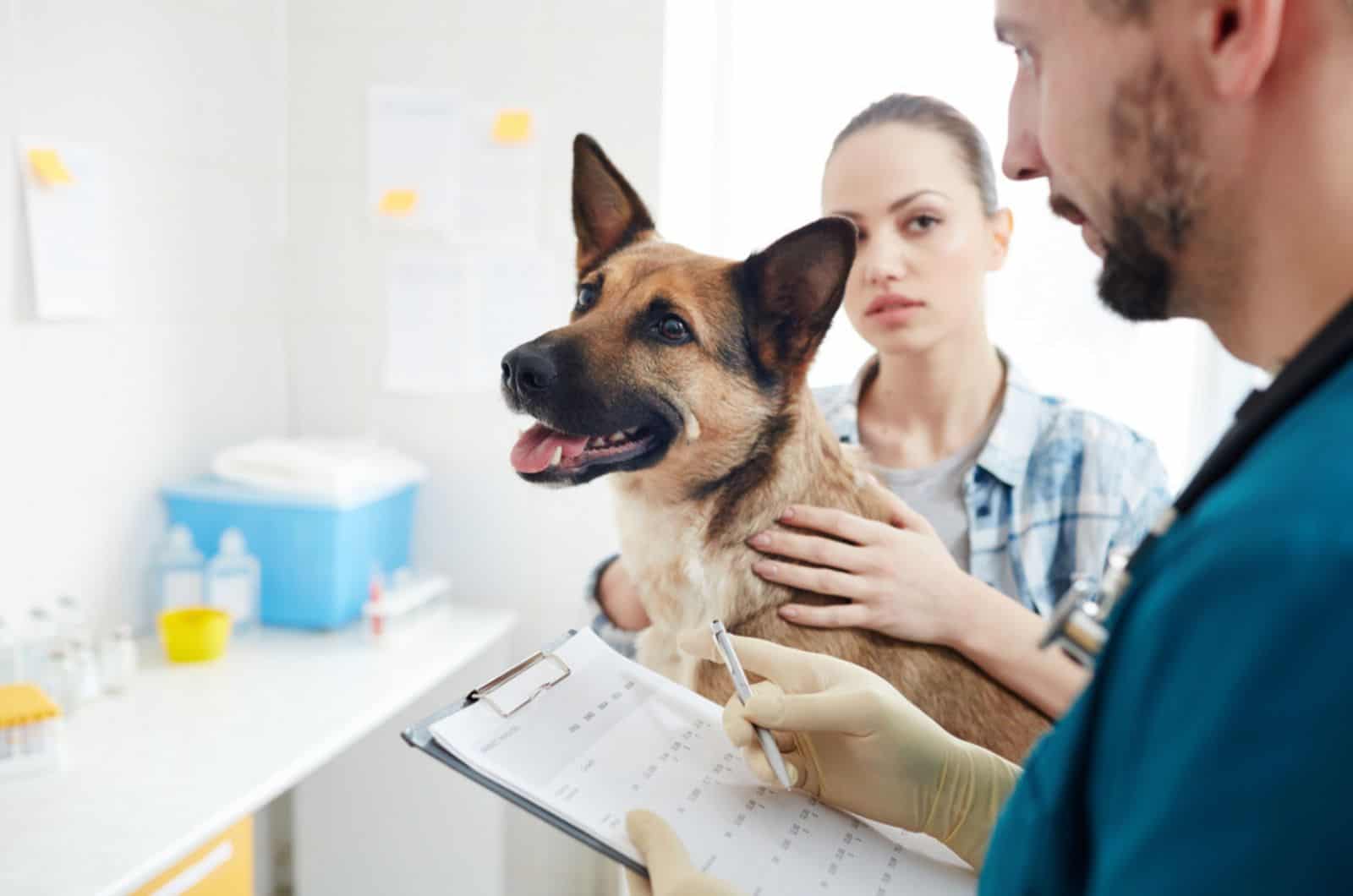
Most yeast ear infections have a musty smell. I am not saying your dog will leave a trail of odor like Pepé Le Pew, but you will notice it, especially if you like to cuddle with your dog. You might think your dog smells like Fritos.
So, when you take a look inside your dog’s ear, you will notice the German Shepherd ear infection symptoms we already mentioned: swelling, redness, pain, and discharge.
7. Itchy Ears
There is a difference between a dog trying to scratch its ears as if to “remove” something that is bothering him, and a dog having itchy ears.
The itchiness of the ears makes the dog typically scratch as if it is scratching any other body part. It is similar to skin itchiness because of flea or mite infestation.
Read Also: Why Is My German Shepherd So Itchy? 7 Causes, 7 Solutions
Even though this symptom can be a sign of mites or fleas, it is better to check the affected ear first, and look for one of the infection symptoms we talked about.
8. Ear Scabs
Scabs and crusts are secondary formations caused by scratching. The dog will likely hurt itself while trying to “scratch away” the problem. The body will protect itself by making crusts over the scratch wounds.
But, these crusts and ear scabs can also be mite infestations. Mite infestation can either be primary or secondary.
Secondary infestation happens when the open wounds from ear scratching are left untreated. They become the perfect place for mites or bacteria to reproduce.
9. Behavioral Change Caused By Hearing Loss
A very important German Shepherd ear infection symptom is a change in behavior. They might become reserved or not as happy to play as usual.
They will avoid any activity that might hurt their ears.
Of course, the behavioral change itself can mean a lot of things. However, combined with the symptoms we mentioned (and possible loss of hearing), it will change the behavior of your GSD.
They won’t react to commands as usual, as if they don’t understand them.
They could also become more agitated or even aggressive. This is all normal because they are experiencing a change in their body that is leaving them “unprotected”.
Luckily, hearing loss is not permanent, and in most cases, it is very mild.
Most of you won’t have to shout when talking to your dog about how someone ate your sandwich at work.
Read Next: Are German Shepherds Aggressive?
German Shepherd Ear Infection Treatment
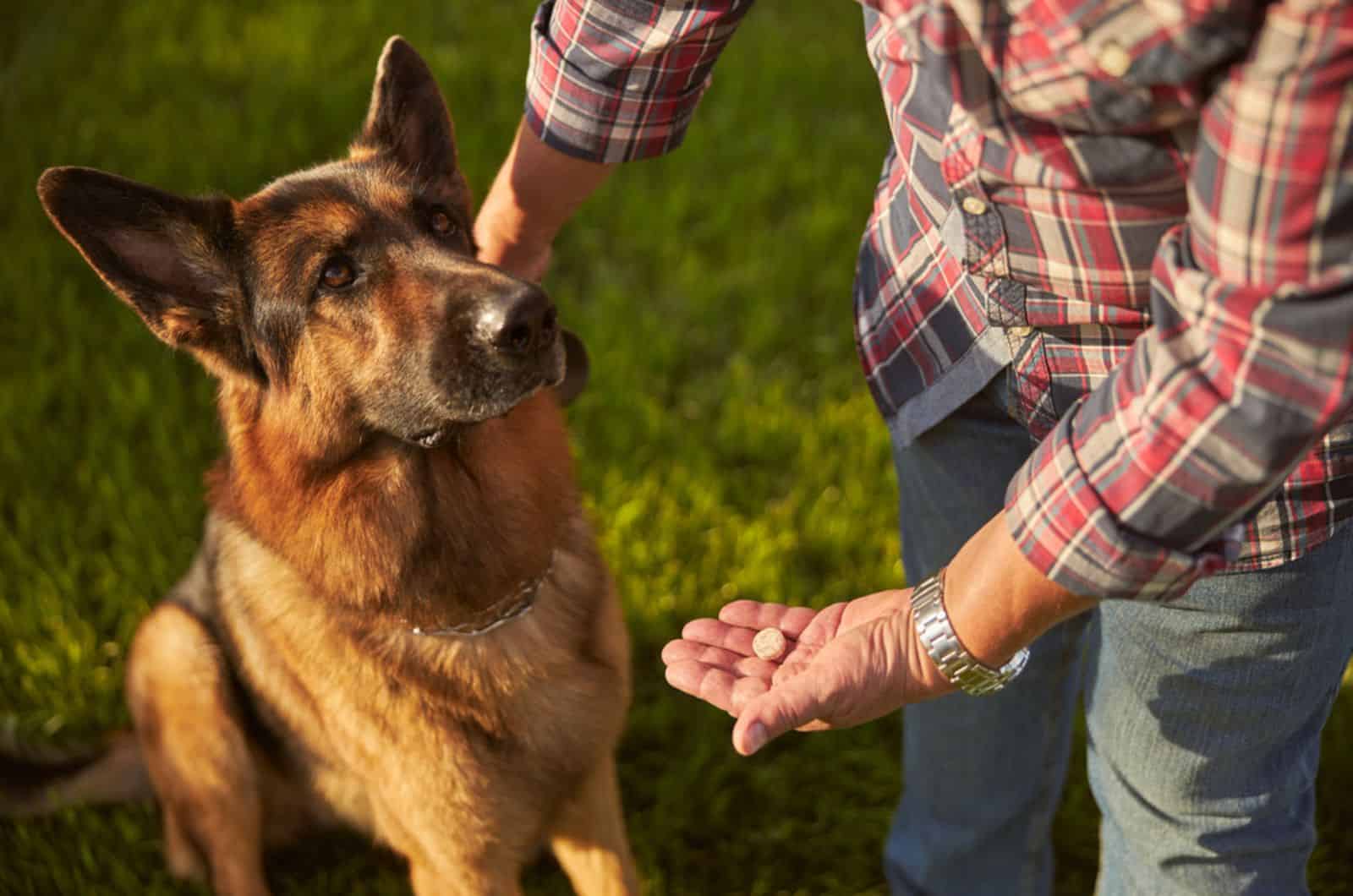
If the vet confirms it is an ear infection, the next step is treatment. It consists of:
- Thorough cleaning of the ear
- Topical medication
- Oral antibiotics
- Anti-inflammatory medication
The last two options are for more severe cases of an ear infection. In most cases, cleaning with topical medication is all it takes to get rid of the ear infection.
If your dog has ear mites, there are many ways to get rid of them, even some home remedies, but always consult your veterinarian before using any of them.
The Conclusion
There are 9 German Shepherd ear infection symptoms that tell us there is something going on with its ears. We won’t be able to know right away what kind of infection it is, but we can notice enough to take our dog to the vet.
The veterinarian will make a proper diagnosis after the clinical examination of your GSD. Afterward, your vet will give the proper treatment as well. It is important not to use any medication on your dog without consulting a professional – a licensed veterinarian.
And, also… most of these symptoms will make your dog anxious, which means your German Shepherd will need lots of love and support.
Don’t yell or punish your dog during the treatment stage. They can’t control themselves, and they don’t know they have to control themselves and not scratch their ears.

